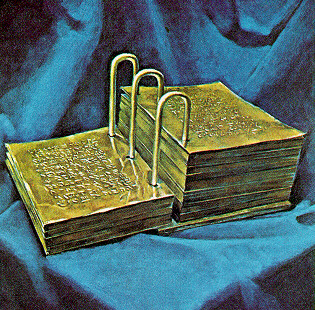THE TREE OF LIFE--read this chapter
here.
Quick Summary:
Lehi sees a vision of the tree of life. He partakes of its fruit and desires his family to do likewise. He sees a rod of iron, a strait and narrow path, and the mists of darkness that enshroud men--Sariah, Nephi, and Sam partake of the fruit, but Laman and Lemuel refuse.Quick Breakdown of symbolic elements in the dream:
Symbol & InterpretationDark and dreary waste (8:7)
Large and spacious field (8:9, 20):
The WorldTree (8:10); Fruit of the tree (8:11-12):
Love of GodRiver of water (8:13):
Hell and the depths thereofRod of Iron (8:19):
The word of God Mist of Darkness (8:23):
Temptations of the devilGreat and spacious building (8:26):
The pride, wisdom, and vanity of the world- - - - - - - - - - - - - - - - - - - - - - - - - - - - - - - - - - -
In reading this chapter, I was struck by the different groups of people in Lehi's dream. Some were faithful for part of the time, some were faithful for all of the time, and some were not faithful at all.
In verses 31-33: These people did not even begin the path leading to the tree. They were "feeling their way" through the darkness to the great and spacious building. Many were drowned in the depths of the river, and many were lost, wandering in strange roads. What kind of people fit into this group? Perhaps these are the ones who want to take the "easy" route--perhaps the difficulty in reaching the Tree made them feel it wasn't worth the fruit. Perhaps these are the people who are "too busy" to nurture the spiritual side of their life. Perhaps these people are of the opinion that religion is good for some people, but that they don't need it to truly be happy.
In verses 21-23: These people were "pressing forward, that they might obtain the path that led to the tree", but when the mist of darkness arose (or temptations) they wandered off and were lost.
They had begun the path to the tree, they had good intentions, but nowhere in these verses does it say that they "held fast" to the rod. Nowhere does it say that they touched it or really even tried to follow it. And, because they were not clinging to it, they were easily overcome by temptation. Is it possible to reach the tree, to experience the fullness of God's love and the blessings He has for us, without holding steadfastly to the Iron Rod (His word)?
In verses 24-28: These people were also "pressing forward" but continued
through the mists of darkness,
clinging to the rod. I love the use of the word "clinging." I am a visual person, and it creates vivid detail in my mind about the state of these people--this rod must have been all they had, especially when traveling through the mists of darkness. They must have been exhausted.
And after persevering until they partook of the fruit--not until they reached the tree, but until they experienced the fruit (or, did all they could to receive a witness), what did they do? They cast their eyes about as if they were ashamed, then they fell into forbidden paths, and were lost. Why? Because suddenly they could see the people in the great and spacious building leering at them. But why else? What is it about this group of people that caused them to forsake everything they fought so very hard (were "clinging") for?
In verse 30: These are the people who held firm to the rod of iron, partook of the fruit, and remained faithful. I love the way this verse describes these groups of people:
"they did press their way
forward,
continually holding fast to the rod of iron, until they came forth and
fell down and partook of the fruit of the tree" (emphasis mine)
I think if we were to ask these people, they would say that the journey to the tree was one of the hardest things they had ever done, but they would also say without hesitation that the fruit of the tree was worth many, many more of those trips.
These people were unaffected by the people in the great and spacious building. What is the difference between this group of people and the previous group, who reached the tree yet fell away? They had to have exercised faith at one point--you could not continue through the mist without it, since you could not see the tree at that time. What changed?
In trying to find this answer, I went to 1 Nephi Ch. 11, where Nephi learns more about the vision Lehi had. In verse 26, after having shown the Tree to Nephi again, the Angel asks Nephi to "Look and behold the condescension of God!"
Elder Jeffrey R. Holland taught that the tree of life is a symbol of Jesus Christ. He said: “The images of Christ and the tree [are] inextricably linked. … At the very outset of the Book of Mormon, … Christ is portrayed as the source of eternal life and joy, the living evidence of divine love, and the means whereby God will fulfill his covenant with the house of Israel and indeed the entire family of man, returning them all to their eternal promises” (
Christ and the New Covenant [1997], 160, 162).
"When people are willing to commit this much of themselves to the gospel, they begin to have these rather overwhelming experiences Alma has described, feeling things they have never felt before. In their excitement about what is happening to them, they may think they now know “of a surety.” But Alma warns us not to stop here. We must not “lay aside” our faith; “for ye have only exercised your faith to plant the seed that ye might try the experiment to know if the seed was good.” (
Alma 32:26.) The seed has not yet taken root, and falling away is a very real danger at this point."
In verse 42 Alma tells us that the fruit of the carefully nourished tree is “most precious, … sweet above all that is sweet, and … white above all that is white, yea, and pure above all that is pure.” His language is strikingly similar to that used by Lehi and Nephi, cited above. But then Alma tells us, “Ye shall feast upon this fruit even until ye are filled, that ye hunger not, neither shall ye thirst.” (
Alma 32:42.) (Ensign, July 1980; by William Clayton Kimball).)
So. . .after all of these (entirely too-lengthy) thoughts, this is what I think is the difference between the two groups of people we talked about:
The group who partook of the fruit but fell away did not
continually feast upon it, as Alma says we need to do. They did not gain a testimony of the aspects of the Condescension of Christ--that is, they did not utilize the blessings of the Atonement, they did not gain a testimony of His ministry and His mission, and so, did not try to emulate Him.
Whew! That was a lot of information. If you want to read an excellent, excellent talk about the Condescension of Christ, go
here. For more about partaking of the fruit, go
here.
What do you think? Have you had any particular thoughts while reading this chapter, related or unrelated to this post? I love this chapter--there is so much symbolism (that we could never hope to cover all in one day). What strikes you the most?






















